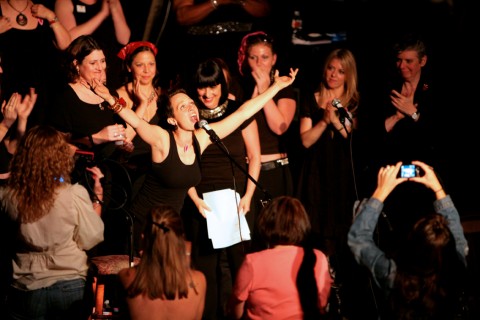
The Vagina Monologues is a collection of monologues performed by women on a variety of vagina-related topics, including virginity and the loss of it, masturbation and self-discovery, rape and childbirth. The monologues were written by Eve Ensler in 1996 and have since been performed internationally at both the amateur and professional levels.
Here at Conn, The Vagina Monologues is an annual event, and this year’s show, boasting approximately ninety women, is held this Saturday, February 19, at 2:00 and 7:30.
Professor Blanche Boyd, who has been involved with the Monologues on many levels, whether acting in, writing about or at helping during stage performances, has seen countless performances of The Vagina Monologues in her life—she even spent a period of time traveling with Ms. Ensler and watching her perform. In her office, she has a framed photo of Glenn Close screaming the word “Cunt!” at a performance held years ago. She still holds fast to the belief that the play is always good and always important, and that every time she sees a performance, it feels like she’s never seen something like it before. She calls the play a “breakthrough of consciousness.”
In my conversations with some of the directors and performers in this year’s production, the topic that kept resurfacing was the transformative power of The Vagina Monologues. Boyd says of Ensler, who she has known for decades, “Eve changed things.”
Not only does the play succeed in changing the way society looks at women’s rights (before Ensler came along, the word “vagina” was censored on television), but as Emily Lake ’11, one of this year’s directors, believes, “it changes people and the way they feel about themselves and their bodies. It empowers women and gives them the courage to be proud of who they are.”
The show reminds women like Eliza Bryant ’12, another director, that “vaginas are not gross,” and that we can, and should, talk about them.
This play addresses topics that are still considered taboo and forces the viewer to think about things that make him or her uncomfortable. Professor Boyd called it the “elephant in the room effect.” We all know about gender inequality, we all know about violence toward women, but we are too afraid to vocalize this knowledge or these feelings. This play allows women to speak out about mistreatment, to give voices to their vaginas, and suggest that, “If my vagina could talk, it would say…” This play reminds women of the right to speak up for themselves, to vocalize what they feel and not to be ashamed of it.
I asked some of the girls what their favorite pieces were, and an overwhelming majority cited “The Flood,” a comical performance about an old woman’s deteriorating (to the point of being nonexistent) relationships with her vagina. Other standouts were “My Vagina Was My Village,” a somber piece about a Bosnian rape camp, and “Reclaiming Cunt,” a “joyous and orgasmic” tribute to the word “cunt.”
The Monologues bring women around the world together, in addition to being liberating for each woman personally. Laura Newman ’11, as well as every one of the directors and performers I spoke with, noted the camaraderie and strong relationships developed among the cast members. Cast bonding is a necessary element of The Vagina Monologues and it includes its own committee during the weeks preceding the show. The building of such strong bonds is not surprising when we consider the way that these women completely let their guards down and open up to each other, and to their audiences, and speak out about words and topics that are usually whispered.
As Mollie Doherty ’12 reminded us, the play features the same monologues year after year (in fact, Ms. Ensler’s only requirement for students performing the play is that they not change anything), and she believes that one of the biggest challenges of being a director is to make the monologues unique to the women performing and directing them.
Audiences this year can expect a performance as varied as the cast itself, which includes Boyd and Professor Mab Segrest performing the monologue, “I Was There in the Room,” a performance that should be particularly poignant, as both of women experienced seeing their children being born. I asked Boyd what she hopes the audience will take from seeing this performance next Saturday, and she replied, “freedom… and courage.”
Conn’s performance of The Vagina Monologues is a fundraiser, and 100% of the proceeds will go toward helping women in Haiti, and the Women’s Center of Southeastern Connecticut. Keep your eye out for V-Week events this week (including a teach-in about who this play benefits). •










[…] This post was mentioned on Twitter by EroticToyWarehouse , Sensual Seductions. Sensual Seductions said: The Vagina Monologues: A Breakthrough in Consciousness http://bit.ly/fWBRnY […]